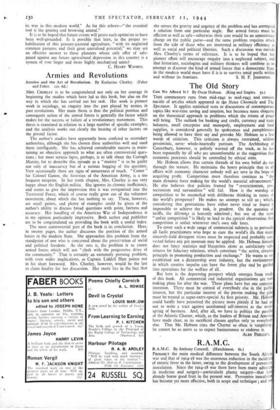The Old Story
Can We Afford It? By Oscar Hobson. (King and Staples. 55.)
This commentary runs from mid-1942 to mid-i943 and . consists mainly of articles which appeared in the News Chronicle and The Spectator. It applies statistical tests to discussions of contemporary topics like war-time saving and taxation, but becomes more eloquent on the theoretical approach to problems which the return of peace will bring. The outlook for banking and credit, currency and trade balances, small enterprise and monopoly, employment and food supplies, is considered generally by spokesmen and pamphleteers being allowed to have their say and provoke Mr. Hobson to a few words of criticism. This criticism is always restrained, seldom pessimistic, never whole-heartedly partisan. The Archbishop of Canterbury, however, is politely warned off the track, as he has been repeatedly by all who are uncomfortable at the suggestion that economic processes should be controlled by ethical aims.
Mr. Hobson allows that certain threads of his 'own belief do run through the texture. He maintains the hoary principle that in all affairs with economic character nobody will act save in the hope of acquiring profit. Competition must therefore continue as "the main dynamic force making for the world's material advancement." He also believes that policies framed for " restrictionism, pro- tectionism and nationalism" will fail. How is the worship of competition to be reconciled with deliberate thinking in terms of the world's prosperity? He makes no attempt to tell us ; which, considering that generations have either never tried or found it impossible to achieve the task, is prudent. On the question of tariffs, the dilemnia is honestly admitted ; but use of the term "unfair competition" is likely to lead to the cynical observation that competition is unfair whenever one's own side loses.
To cover such a wide range of commercial subjects is to persuade
all facile practitioners who hope to cure the world's ills that many sincerely-held divergent views must be respected and probably con- verted before any pet nostrum may be applied. Mr. Hobson himself does not fancy statistics and blueprints alone" as satisfactory sub- stitutes for fiduciary relations, which constitute "the active, creative principle in promoting production and exchange." He wants to see established not a dictatorship over industry, but the environment in "which creative impulse can have the freest Play and be -guided into operations for the welfare Of all.
But here is the depressing prospect which. emerges from study of this book. All commercial and industrial organisations are now making plans for after the war. These plans have but one common intention. There must be control of everybody, else in the public interest, but the particular interest of the person making the plan must be treated as super-extra-special Az first priority. Mr. 3-16bson could hardly have presented the picture more plainly if he had se out to write a tract against unashamed self-interest as the main spring of business. And, after all, we have in politics the -parallel of the Atlantic Charter, which, as the leaders of Britain and Ameri have made clear, in its sacrificial clauses applies only'-to everybod else. That Mr. Hobson cites the Charter so- Often is .-surprising he cannot be so naïve as to expect basinessmen to' etidorie it.
ALAN Pini..urs-


























 Previous page
Previous page